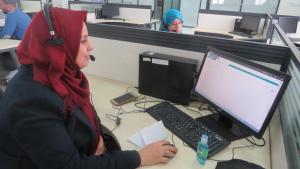Algeria’s COVID-19 hotline props up rapid response
Algiers, 12 March 2020 – Leaning over desks with hands-free headsets hugging veils or bare heads, a team of doctors answers seemingly endless phone calls. Hundreds of worried callers ring every day to seek advice on how to stay safe, understand the symptoms or find out if the flu they are battling is indeed the new COVID-19.
Algeria, with the second-highest COVID-19 cases in Africa, set up a call centre in the capital Algiers on 26 February, a day after it confirmed the first case of the virus, to boost early detection and help contain wider spread of the disease. Around 10 days after being established, more than 46 000 people had called the centre’s 24-hour toll-free number.
Volunteer doctors manage the 20 extensions of the hotline. “The toll-free line is critical in providing the right information to the public about coronavirus. Through the calls we counter false information among communities and on social media about the disease,” said Dr Hammadi Samia, in charge of International Health Regulations at Algeria’s Ministry of Health.
“We also encourage people to take the correct measures to avoid the spread of COVID-19.”
Algeria has now reported 20 confirmed COVID-19 cases, the second highest after Egypt which has 55 cases.
Amid answering dozens of calls, Dr Bahia Bousri explains that she mainly provides callers with information about the disease and if there is a suspected case directs them to a medical centre for immediate diagnosis. “People want to understand how one can get infected with coronavirus and how to avoid infection. We receive calls all day and all night long,” says Dr Bousri, a practicing doctor for 13 years.
She noted that the majority of callers are housewives. “They are worried and want to know how to protect their families, what the symptoms are and what to do about them,” Says Dr Bousri, giving a run-down of how COVID-19 is transmitted and the good hygiene practices that people need to adopt.
Allaying fears
Algeria, which is in northern Africa, is currently in the midst of the flu season unlike much of the rest of the continent where the season hits at a different time. With COVID-19, worries abound among many when they catch the seasonal flu, says Dr Khaled Ouafek, who also works at the call centre. He explains that some people who have flu call the hotline to find out if their fever or other flu symptoms mean that they have COVID-19.
“They describe minor flu symptoms … and we tell them that there’s no need for alarm if they haven’t been in contact with any sick person or someone who has symptoms. If necessary we refer them to a specialist,” he says.
Each of Algeria’s 48 provinces has an infectious disease centre. The capital’s main referral hospital that also handles infectious disease serves the Algiers province. Callers who meet the standard COVID-19 suspect case definition are referred to the main hospital for diagnosis and treatment if necessary.
Because people are worried about the disease, Dr Ouafek says, rumours and inaccurate information have spawned panic among many. One of the call centre’s main tasks is to allay fears by providing the right information and countering falsehoods about COVID-19.
“Some women call to find out if drinking herbal tea or medicinal plants can prevent coronavirus. Others wonder whether simply wearing a mask while leaving home is a guarantee that they won’t get infected,” recounted Dr Bousri.
“some say that they no longer want to leave their houses, but we explain to them that there is no need to panic.”
To assist with risk communication, public outreach and addressing misinformation and rumours, the World Health Organization (WHO) recommends that countries set up a call centre. Trained call centre staff can provide information, advice and counselling services as well as reporting suspected cases or ensuring that requests for medical assistance are met. Rumour monitoring tools and guidelines for addressing rumours have also been published by the WHO Regional Office for Africa and shared with country offices.



